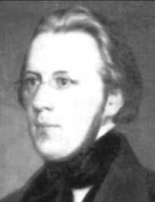Heinrich Baermann (1784–1847)

A celebrated clarinet virtuoso, Baermann helped shape the instrument’s Romantic voice. His Quintet, Op. 23, highlights the clarinet’s lyrical and virtuosic capabilities, offering warm melodies, graceful ornamentation, and dramatic contrasts, all infused with the spirit of early 19th-century Romanticism.
Heinrich Baermann (1784-1847) was born in the Prussian town of Potsdam just outside of Berlin. He studied clarinet and composition in Berlin and became one of the most important clarinet virtuosi during the first part of the the 19th century and is generally considered the father of modern clarinet technique. Although he composed several substantial works, today he is remembered as the inspiration for more famous works by the likes of Carl Maria von Weber, Felix Mendelssohn, Giocomo Meyerbeer, Franz Danzi and Peter Lindpaintner, among others. The middle movement of his 1821 Clarinet Quintet No. 3 in E flat Major, Op. 23, a beautiful Adagio, was for more than a century attributed to Richard Wagner, and for this reason, it is one of the few chamber works of his that survived into the 20th century and received new editions.